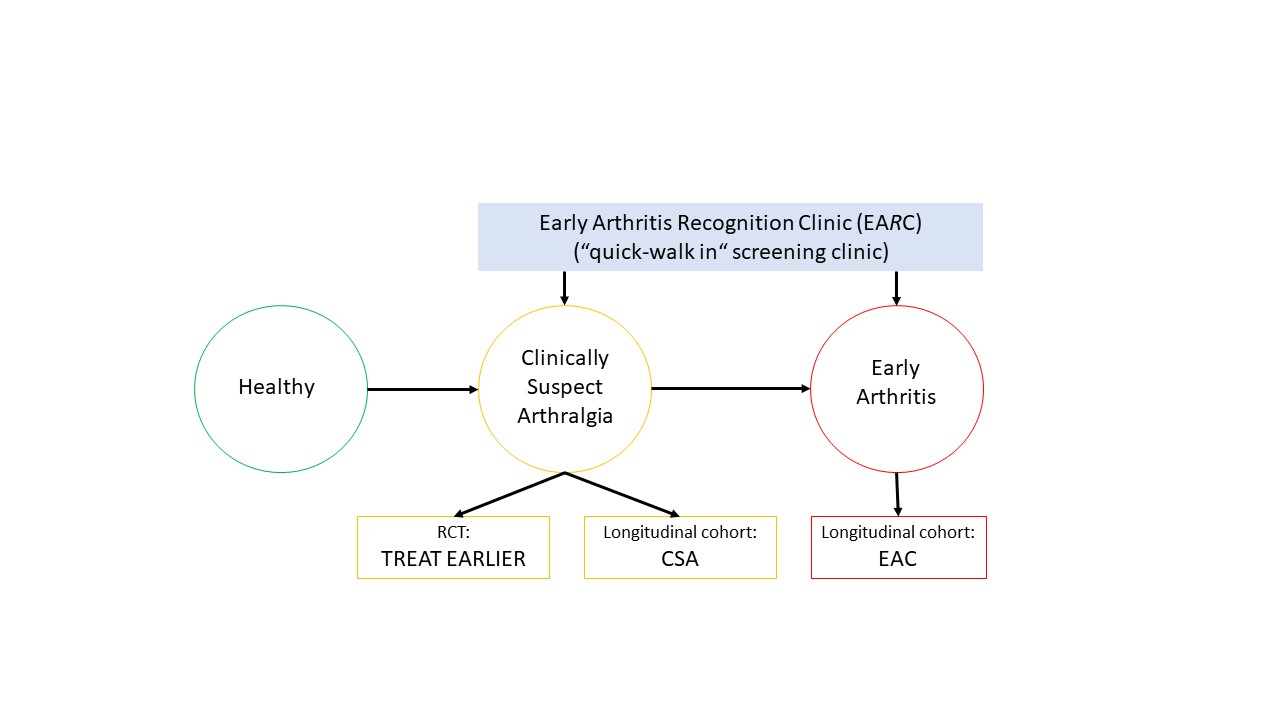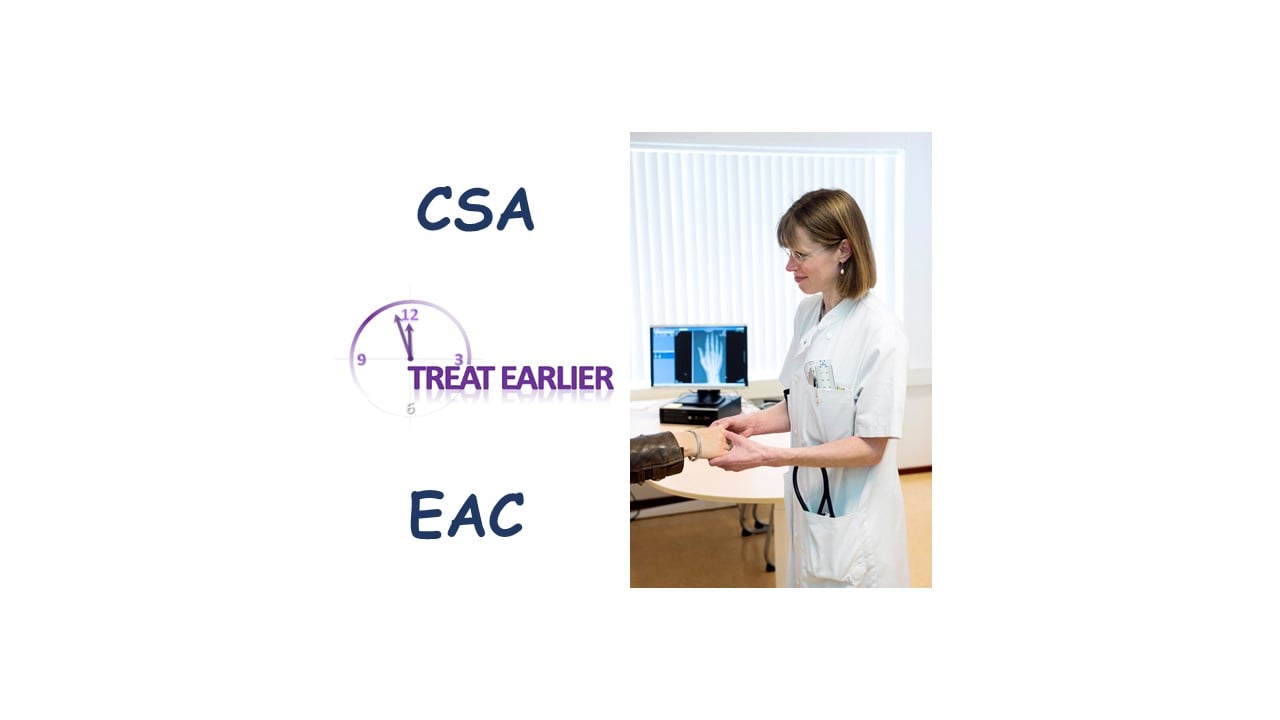Early recognition and prevention of RA
The research group maintains world’s largest and longest ongoing early arthritis cohort and studies even earlier stages and treatment in patients with clinically suspect arthralgia. Over the past three decades, our findings have led to advances in understanding the pathophysiology and treatment of rheumatoid arthritis
&width=826&height=464)
Aim
Our aim is to 1) unravel the pathogenesis of RA development and disease progression, 2) develop adequate methodology for identification and risk stratification for patients with suspected RA, and 3) to prevent RA or shorten the disease burden.
To this aim we apply an integrated approach to basic research and patient care with cross-disciplinary collaboration (biologists, immunologists, radiologists, engineers) in the Medical Delta (in collaboration with Erasmus MC and TU Delft).
…Aim
Our aim is to 1) unravel the pathogenesis of RA development and disease progression, 2) develop adequate methodology for identification and risk stratification for patients with suspected RA, and 3) to prevent RA or shorten the disease burden.
To this aim we apply an integrated approach to basic research and patient care with cross-disciplinary collaboration (biologists, immunologists, radiologists, engineers) in the Medical Delta (in collaboration with Erasmus MC and TU Delft).
Cohorts and future
The integration between clinic and basic/translational research is exemplified by our Early Arthritis Clinic (EAC). Starting in 1993, over 4500 patients are followed longitudinally for diagnosis, disease activity, function, and destruction as measured by imaging techniques, serologic, genetic and cellular parameters. Some patients have been followed for >25 years.
The aim is to increase the knowledge and understanding of risk factors for development of the disease, to develop diagnostic and prognostic algorithms and to improve the effectiveness of therapeutic strategies.
Our Clinically Suspect Arthralgia (CSA) cohort includes patients in the symptomatic stage preceding clinically apparent arthritis and RA. stages. The first patient was included in 2012. Focus in this cohort is to better understand the development of RA using amongst others imaging of subclinical joint inflammation (differentiating this from normal variants, and developing short MRI sequences to facilitate implementation of MR in CSA patients in clinical practice), hand function tests, and serologic, gene expression and cellular parameters. Thorough studies on parameters during the transition to RA or to spontaneous resolution can reveal the mechanisms that are decisive for disease chronicity. In the Rotterdam area a completely similar multicenter CSA cohort started in 2017, this is led within a Medical Delta partnership, facilitated by the position of prof A van der Helm in the LUMC and Erasmus MC.
An intervention trial in patients with CSA and subclinical joint inflammation is the TREAT EARLIER trial. TREAT EARLIER is short for: Treat Early Arthralgia to Reverse or Limit Impending Exacerbation to Rheumatoid arthritis. This is a region-wide proof-of-concept trial in the Medical Delta that studies whether progression to persistent clinical arthritis/RA or the disease burden can be reduced by a temporary treatment with methotrexate. This trial started in 2015. After the initial trial in which patients are followed for 2 years, follow-up is extended to 5 years to study long-term effects.
Allowing early access to rheumatologic care is crucial. Since 2010 our department has a “quick-walk in“ screening (outpatient) clinic, named the Early Arthritis Recognition Clinic (EARC), where patients can be referred to by their General Practitioner and which is easily accessible (1.5 lines setting, in between primary and secondary care). This benefits both clinical practice and research. Eligible patients visiting the EARC are asked if they are willing to participate in our cohorts and studies.
The studies in our cohorts are performed by clinicians, immunologists, biologists, epidemiologists and are supported by research nurses and data managers.
In sum the research is aimed at early access to medical care, timely diagnosis and very early personalized intervention, aiming at precision prevention.

Projects
Key publications
Our team
Group leader
- Prof. dr. A. van der Helm-van Mil, Rheumatologist
Team members
- Dr. H. van Steenbergen, Postdoc, rheumatologist
- Dr. E. van Mulligen, Postdoc
- Dr. A. Çevirgel, Postdoc
- Drs. S Claassen, Phd-student
- Drs. D Ton, Phd-student
- Drs. S van Griethuysen, Phd-student
- Drs. Q.A. Dumoulin, Phd-student
- Drs. D van der Kaaij, Phd-student
- Drs. S.J.H. Khidir, Phd-student
- Drs. M. Hosseini-Malekroudi, PhD student
- Drs. R. van der Wal, Phd-student